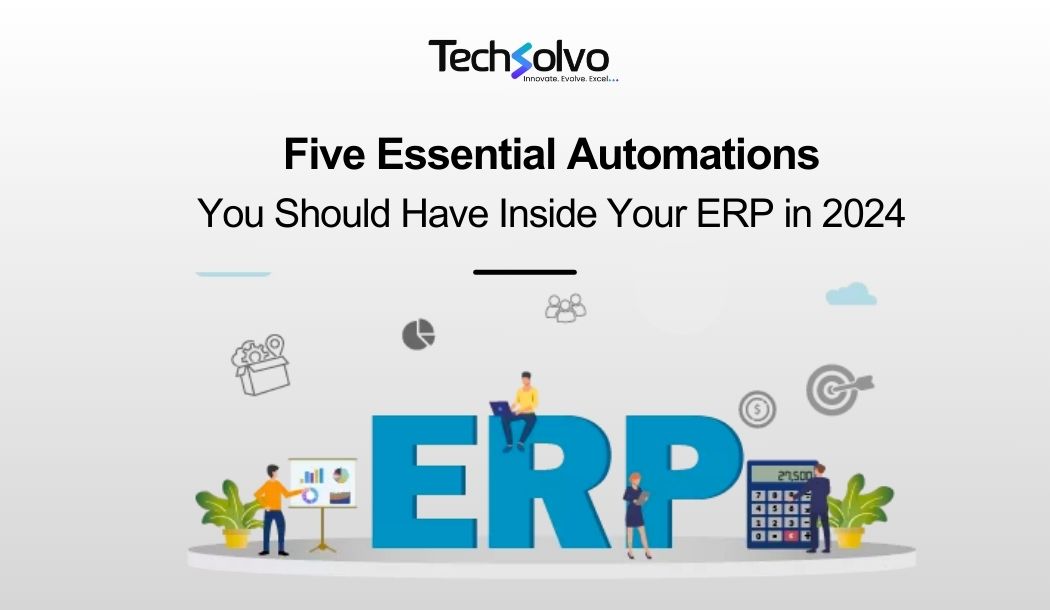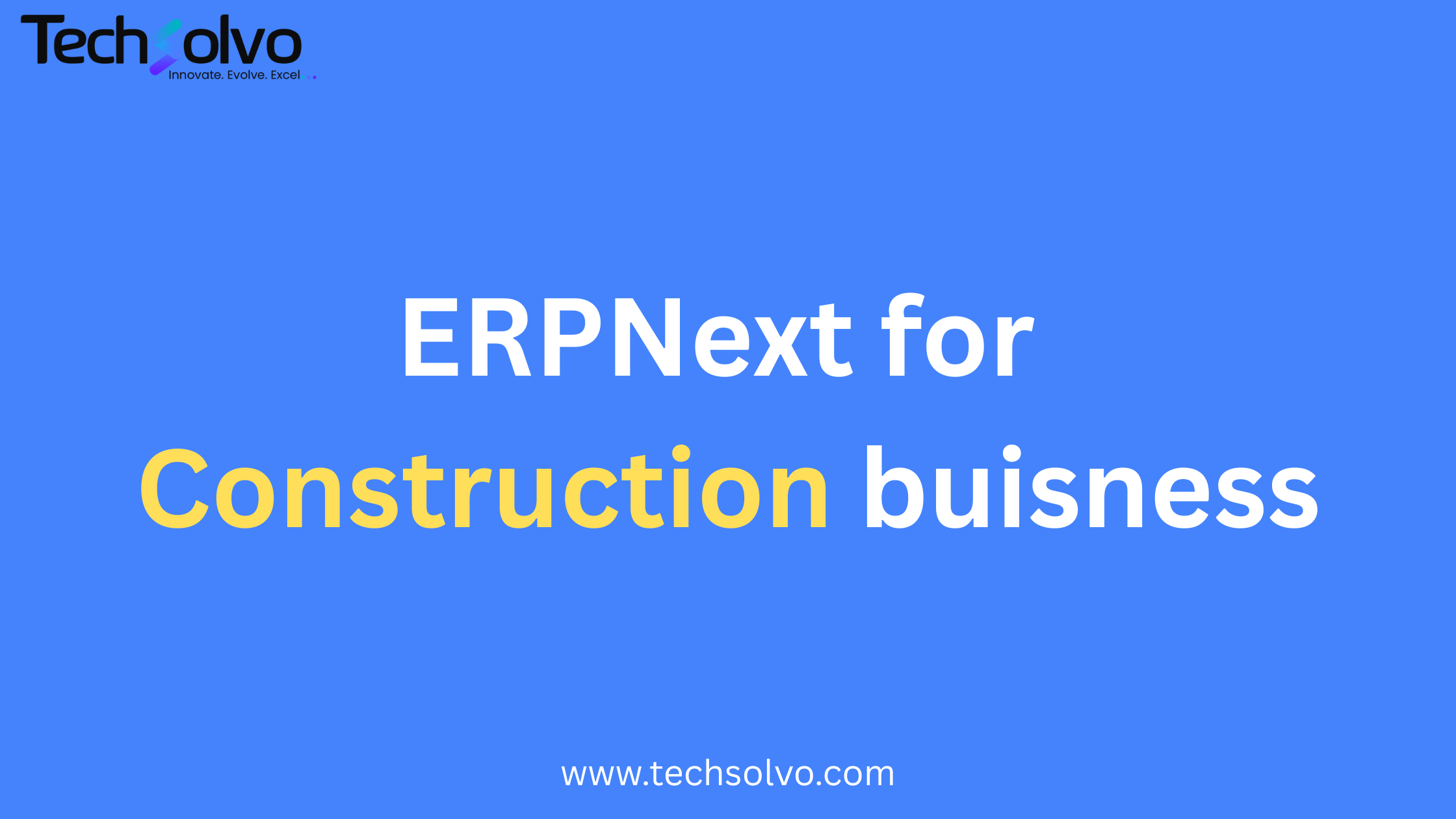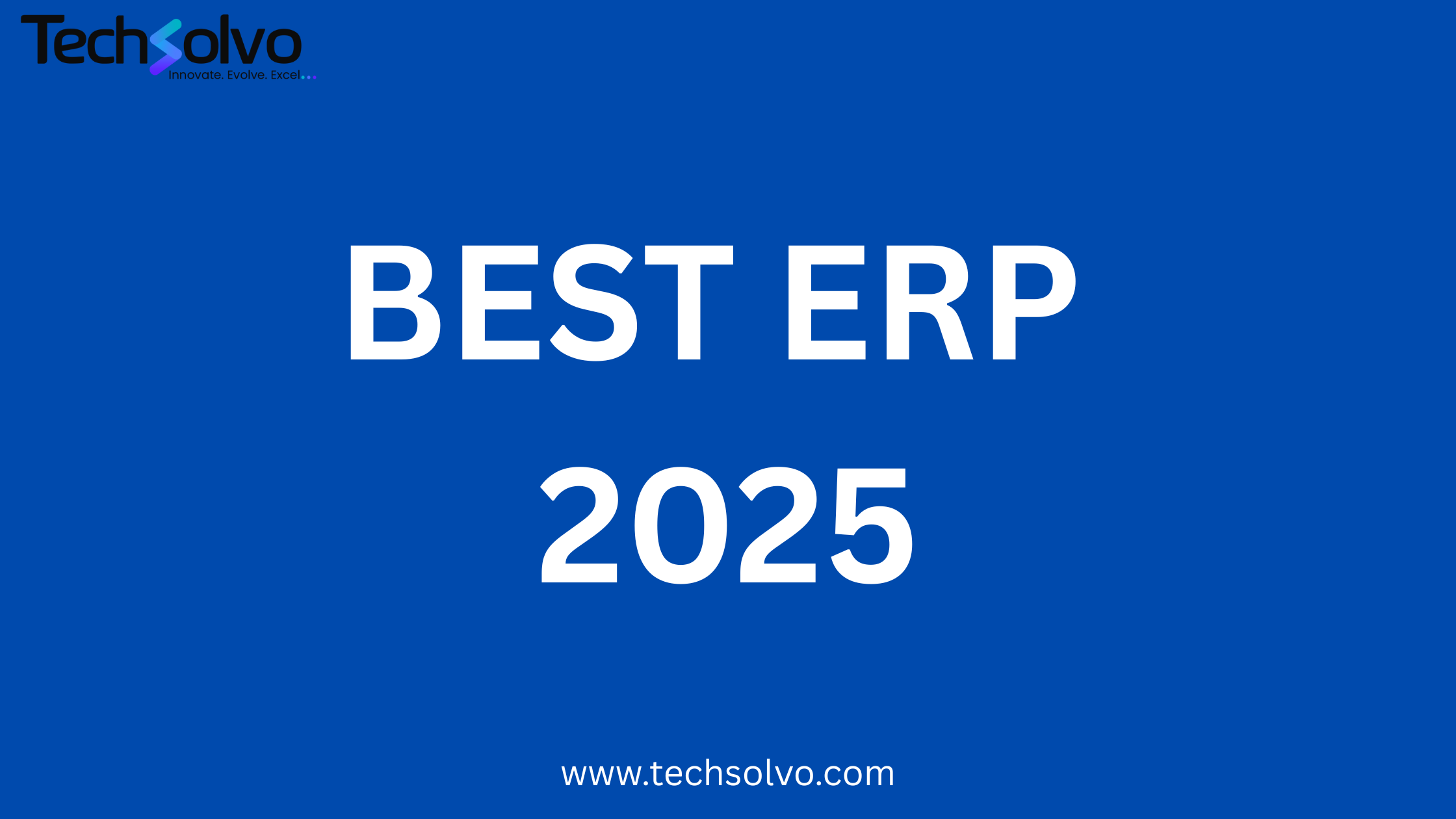
In today's rapidly evolving business landscape, staying competitive means embracing automation within your Enterprise Resource Planning (ERP) system. As we step into 2024, the integration of cutting-edge technologies becomes paramount for businesses striving for efficiency, agility, and innovation. Here are five essential automation features that should be at the core of your ERP strategy this year:
AI-Powered Predictive Analytics
In today's data-rich environment, businesses are inundated with vast amounts of information. However, the real challenge lies in extracting actionable insights from this data to drive informed decision-making. This is where AI-powered predictive analytics steps in, revolutionizing the way businesses anticipate future trends, identify potential risks, and seize opportunities.
At the heart of AI-powered predictive analytics is the integration of artificial intelligence and machine learning algorithms within the ERP system. These algorithms analyze historical data, detect patterns, and extrapolate future outcomes with remarkable accuracy. Whether it's forecasting demand, optimizing inventory levels, or predicting equipment maintenance needs, AI empowers businesses to stay ahead of the curve in a dynamic marketplace.
Key Benefits of AI-Powered Predictive Analytics:
-
Enhanced Forecasting Accuracy: Traditional forecasting methods often fall short in capturing the complexities of modern business environments. AI-powered predictive analytics, however, leverages advanced algorithms to analyze large datasets, identify hidden patterns, and generate more accurate forecasts. This enables businesses to make informed decisions based on real-time insights, minimizing the risk of overstocking, stockouts, or missed opportunities.
-
Proactive Risk Management: By identifying potential risks and opportunities in advance, AI-powered predictive analytics enables businesses to take proactive measures to mitigate risks and capitalize on opportunities. Whether it's predicting market trends, identifying potential supply chain disruptions, or flagging anomalies in financial data, predictive analytics empowers organizations to stay agile and resilient in the face of uncertainty.
-
Optimized Resource Allocation: In a competitive business landscape, resource optimization is critical for maximizing efficiency and profitability. AI-powered predictive analytics helps businesses allocate resources more effectively by providing insights into demand patterns, resource utilization rates, and performance trends. Whether it's optimizing production schedules, allocating marketing budgets, or managing workforce capacity, predictive analytics enables businesses to optimize resource allocation and drive operational excellence.
-
Improved Customer Insights: Understanding customer behavior and preferences is essential for delivering personalized experiences and driving customer loyalty. AI-powered predictive analytics enables businesses to analyze customer data, identify buying patterns, and anticipate future needs. By segmenting customers based on their preferences, purchase history, and behavior, businesses can tailor their marketing strategies, product offerings, and service delivery to meet the unique needs of each customer segment.
-
Faster Decision-Making: In today's fast-paced business environment, speed is of the essence. AI-powered predictive analytics enables businesses to make faster, data-driven decisions by providing real-time insights into market trends, customer behavior, and operational performance. By automating data analysis and generating actionable insights, predictive analytics empowers decision-makers to act quickly and decisively, gaining a competitive edge in the market.
In conclusion, AI-powered predictive analytics represents a paradigm shift in how businesses leverage data to drive strategic decision-making. By harnessing the power of AI and machine learning, businesses can anticipate future trends, mitigate risks, optimize resources, and deliver personalized experiences that delight customers and drive sustainable growth. In an increasingly competitive marketplace, AI-powered predictive analytics is not just a luxury—it's a necessity for businesses looking to thrive in the digital age.
Robotic Process Automation (RPA)
In today's fast-paced business environment, efficiency and agility are paramount for success. However, many organizations find themselves bogged down by manual, repetitive tasks that consume valuable time and resources. This is where Robotic Process Automation (RPA) steps in, offering a solution to automate mundane tasks and streamline operations with unprecedented speed and accuracy.
At its core, RPA involves the use of software robots or "bots" to mimic human actions and automate repetitive tasks within the ERP system. These bots can perform a wide range of activities, from data entry and invoice processing to order fulfillment and report generation, freeing up human resources for more strategic and value-added activities.
Key Benefits of Robotic Process Automation (RPA):
-
Improved Efficiency: By automating repetitive tasks, RPA eliminates the need for manual intervention, reducing errors and processing times significantly. Tasks that once took hours or days to complete can now be executed in minutes, enabling organizations to process data faster and respond to customer demands more efficiently.
-
Cost Savings: Automating repetitive tasks with RPA not only improves efficiency but also leads to significant cost savings. By reducing the need for manual labor, organizations can lower operational costs, minimize errors, and optimize resource utilization. Additionally, RPA enables organizations to scale operations without increasing headcount, providing a cost-effective solution for growing businesses.
-
Enhanced Accuracy: Unlike humans, software robots do not suffer from fatigue or human error. RPA ensures consistent and accurate execution of tasks, minimizing the risk of errors and improving data quality. This is especially crucial for tasks that require high levels of accuracy, such as financial reporting, compliance checks, and data entry.
-
Scalability and Flexibility: One of the key advantages of RPA is its scalability and flexibility. Whether you're a small startup or a large enterprise, RPA can be easily scaled to meet your growing business needs. Additionally, RPA bots can be deployed across multiple systems and applications, providing seamless integration and interoperability across the organization.
-
Empowered Workforce: By automating repetitive tasks, RPA frees up human resources for more strategic and value-added activities. Instead of spending hours on data entry or manual processing, employees can focus on tasks that require creativity, problem-solving, and critical thinking. This not only enhances employee satisfaction but also drives innovation and business growth.
In conclusion, Robotic Process Automation (RPA) is a game-changer for organizations looking to streamline operations, improve efficiency, and drive digital transformation. By automating repetitive tasks, RPA enables organizations to reduce costs, improve accuracy, and empower their workforce to focus on activities that drive innovation and growth. In an increasingly competitive business landscape, RPA is not just a technology—it's a strategic imperative for organizations looking to stay ahead of the curve.
Integration with IoT Devices
In an era dominated by interconnected devices and real-time data, harnessing the power of the Internet of Things (IoT) is essential for businesses looking to gain a competitive edge. By integrating IoT devices with their ERP systems, organizations can unlock a treasure trove of valuable insights, optimize processes, and enhance decision-making capabilities.
Key Benefits of Integration with IoT Devices:
-
Real-Time Monitoring: Integration with IoT devices enables organizations to monitor assets, processes, and operations in real-time. Whether it's tracking inventory levels, monitoring equipment performance, or analyzing environmental conditions, IoT sensors provide continuous, up-to-date data that can be leveraged to make informed decisions and respond to changes quickly.
-
Predictive Maintenance: By collecting data on equipment performance and health in real-time, IoT integration enables organizations to implement predictive maintenance strategies. By analyzing patterns and trends in equipment data, organizations can anticipate maintenance needs, detect potential issues before they escalate, and schedule maintenance activities proactively. This not only minimizes downtime but also extends the lifespan of equipment and reduces maintenance costs.
-
Optimized Supply Chain Management: Integration with IoT devices revolutionizes supply chain management by providing end-to-end visibility and transparency. From tracking shipments in real-time to monitoring inventory levels and demand patterns, IoT sensors enable organizations to optimize inventory management, reduce stockouts, and improve order fulfillment rates. Additionally, IoT integration enables organizations to identify inefficiencies in the supply chain and implement corrective actions to streamline operations and reduce costs.
-
Enhanced Customer Experience: By leveraging IoT data, organizations can gain valuable insights into customer behavior, preferences, and usage patterns. Whether it's analyzing product usage data to identify opportunities for upselling or personalizing marketing campaigns based on customer preferences, IoT integration enables organizations to deliver personalized experiences that delight customers and drive loyalty.
-
Improved Decision-Making: Integration with IoT devices empowers organizations to make data-driven decisions based on real-time insights. By collecting and analyzing data from multiple sources, including IoT sensors, ERP systems, and external data sources, organizations can gain a holistic view of their operations and identify opportunities for optimization and improvement. Whether it's optimizing production schedules, allocating resources more effectively, or identifying new market opportunities, IoT integration enables organizations to make informed decisions that drive business growth.
In conclusion, integration with IoT devices is a game-changer for organizations looking to leverage the power of real-time data to optimize processes, enhance customer experiences, and drive business growth. By collecting and analyzing data from interconnected devices, organizations can gain valuable insights, implement predictive maintenance strategies, optimize supply chain management, and make informed decisions that set them apart in a competitive marketplace. In an increasingly connected world, IoT integration is not just a technology—it's a strategic imperative for organizations looking to thrive in the digital age.
Chatbots for Customer Support
In today's hyperconnected world, delivering exceptional customer service is no longer just a competitive advantage—it's a necessity. With consumers expecting instant gratification and round-the-clock support, businesses are turning to chatbots to meet these evolving demands. Integrated within your ERP system, chatbots powered by Natural Language Processing (NLP) offer a seamless and efficient way to provide customer support.
Powered by sophisticated algorithms, chatbots can engage with customers in natural language, understand their queries, and provide instant responses or solutions. Whether it's answering product inquiries, assisting with order placements, or resolving technical issues, chatbots offer a personalized and efficient support experience.
Key Benefits of Chatbots for Customer Support:
-
24/7 Availability: Unlike human agents, chatbots are available round-the-clock, providing customers with instant support anytime, anywhere. Whether it's during office hours or after hours, chatbots ensure consistent and uninterrupted support, enhancing customer satisfaction and loyalty.
-
Instant Responses: With chatbots, customers no longer have to wait in queue or navigate through complex phone menus to get assistance. Chatbots provide instant responses to customer queries, reducing response times and improving overall customer experience.
-
Efficient Issue Resolution: By automating routine customer interactions, chatbots free up human agents to focus on more complex and high-value tasks. This not only improves efficiency but also ensures that customer inquiries are addressed promptly and accurately.
-
Personalized Engagement: Chatbots can be programmed to personalize interactions based on customer preferences, purchase history, and behavior. By delivering tailored recommendations and assistance, chatbots enhance engagement and foster deeper relationships with customers.
-
Scalability: As your business grows, so do customer support needs. Chatbots offer scalability, allowing you to handle a large volume of customer inquiries without increasing operational costs. Whether it's handling peak periods or managing multiple customer interactions simultaneously, chatbots provide a cost-effective solution for scaling customer support operations.
In conclusion, integrating chatbots within your ERP system is a strategic move to enhance customer experience, improve efficiency, and drive business growth. By providing instant and personalized support, chatbots empower businesses to meet the evolving demands of today's consumers and stay ahead of the competition.
Blockchain for Supply Chain Transparency
In a globalized marketplace where supply chains span continents and involve numerous stakeholders, transparency and trust are paramount. Enter blockchain technology, offering a decentralized and immutable ledger of transactions that ensures transparency, traceability, and authenticity across the supply chain.
Integrated with your ERP system, blockchain technology provides a secure and transparent way to record and track transactions, from the sourcing of raw materials to the delivery of finished products. Each transaction recorded on the blockchain is encrypted and linked to previous transactions, creating a tamper-proof and auditable record of every step in the supply chain.
Key Benefits of Blockchain for Supply Chain Transparency:
-
Immutable Recordkeeping: Blockchain technology ensures that once a transaction is recorded on the ledger, it cannot be altered or deleted. This immutability provides a high level of trust and integrity, making blockchain an ideal solution for recording critical supply chain data, such as product origins, certifications, and compliance records.
-
End-to-End Visibility: By integrating blockchain with your ERP system, you gain real-time visibility into every stage of the supply chain. From the sourcing of raw materials to the distribution of finished products, blockchain provides a transparent and auditable record of transactions, enabling stakeholders to track the movement of goods and verify their authenticity.
-
Enhanced Traceability: In the event of a product recall or quality issue, blockchain technology enables swift and accurate traceability of affected products. By tracing the origin and movement of products on the blockchain, organizations can pinpoint the source of the issue, identify affected batches, and take corrective actions to mitigate risks and protect consumers.
-
Streamlined Compliance: Compliance with regulations and standards is a top priority for businesses operating in highly regulated industries. Blockchain technology simplifies compliance by providing a secure and transparent way to record and verify compliance-related data, such as certifications, audits, and inspections.
-
Smart Contract Automation: In addition to recording transactions, blockchain technology enables the execution of smart contracts—self-executing contracts with predefined rules and conditions. Integrated with your ERP system, smart contracts automate contract execution, payment processing, and compliance checks, streamlining supply chain operations and reducing administrative overhead.
Leveraging Techsolvo for Seamless Integration of ERP Solutions
As businesses recognize the critical importance of integrating essential automation features like AI-powered predictive analytics, Robotic Process Automation (RPA), IoT devices, chatbots, and blockchain within their ERP systems, the need for a reliable integration partner becomes paramount. This is where Techsolvo steps in as your trusted ally in navigating the complexities of ERP integration and harnessing the full potential of these cutting-edge technologies.
Techsolvo brings to the table a wealth of expertise and experience in ERP solutions and automation technologies. With a team of skilled professionals well-versed in AI, machine learning, IoT, NLP, and blockchain, Techsolvo is equipped to handle the intricacies of integrating these components seamlessly into your ERP system.
Our approach to ERP integration is tailored to your unique business needs, ensuring that each automation feature is implemented effectively and aligned with your strategic objectives. From conducting thorough assessments and feasibility studies to designing and implementing customized solutions, Techsolvo takes a holistic approach to ERP integration, ensuring that every component works harmoniously to drive efficiency, innovation, and growth.
Furthermore, Techsolvo prioritizes transparency, communication, and collaboration throughout the integration process, keeping you informed and involved at every step. Whether it's providing regular updates, addressing concerns, or offering training and support, we are committed to ensuring a smooth and successful integration experience.
In conclusion, partnering with Techsolvo for ERP integration means unlocking the full potential of automation technologies to drive business transformation and success. With our expertise, experience, and commitment to excellence, we empower businesses to stay ahead of the curve, streamline operations, enhance customer experiences, and achieve their strategic goals in today's digital age. Let Techsolvo be your trusted partner in harnessing the power of automation within your ERP system and propelling your business to new heights of success.
Insights
To properly understand the things that are prevalent in the industries, keeping up-to-date with the news is crucial. Take a look at some of our expertly created blogs, based on full-scale research and statistics on current market conditions.

How ERPNext Transforms Construction Businesses in the UAE | Techsolvo
Learn how ERPNext helps UAE construction firms streamline projects, procurement, retentio…

Why ERPNext is the Best ERP Software for Businesses in 2025 | Techsolvo
Discover why ERPNext is the top choice for modern businesses in 2025. Learn how Techsolvo…

Why Techsolvo is the Best ERPNext Implementation Partner in UAE
Discover why Techsolvo is recognized as the best ERPNext agency in the UAE. Trusted by ma…

